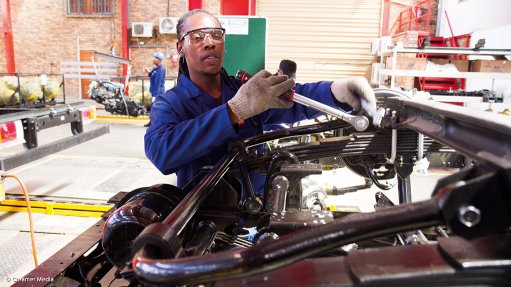
SA FIRST Hyundai Automotive South Africa assembled the first H100 light commercial vehicle at its Apex plant in Benoni, earlier this month
Photo by: Duane Daws
Automotive manufacturer Hyundai Automotive South Africa assembled its first H100 light commercial vehicle (LCV) at its Apex plant, in Benoni, Gauteng, earlier this month.
Hyundai marketing director Stanley Anderson tells Engineering News that the company hopes to assemble about 3 000 units this year and will supplement market demand with an additional 1 500 fully assembled H100s, which will be imported from South Korea throughout the year.
The vehicle components used to assemble H100s at the Apex plant are also imported from South Korea.
“The plant will reach full production capacity for the H100 by midyear, assembling about 350 units a month,” asserts Anderson, adding that Hyundai is confident that the projected volumes for this year will be reached, owing to the popularity of the vehicle.
Meanwhile, the Apex plant began assembly of the Hyundai HD72 four-ton truck in August last year. The company will assemble about five hundred HD72 trucks this year, depending on market demand.
Anderson tells Engineering News that the R55-million capital purchase of the Apex assembly plant from JSE-listed transport services company Imperial will have successfully created about 60 jobs by the time full production capacity is reached.
The Automotive Market
Anderson points out that LCV sales increased by 3.4% year-on-year in 2014, while passenger vehicles dropped by 2.5% in the same year. Further, sales for extra-heavy trucks increased by 10% and for buses by 34% last year.
Hyundai, meanwhile, increased its market share in the 4 × 2 single-cab segment o LCVs from 7.8% in 2013 to 8.5% in 2014. Sales for imported H100s closed at just more than 4 000 units last year, about 400 more than the 2013 total.
“LCVs are typically sold to small and medium-sized enter-prises (SMEs) and courier com-panies. These are good signs that SMEs in South Africa are growing,” Anderson comments, adding that increased LCV sales might also be linked to the expanding courier market that emerged in response to the South African Post Office strike last year, which was organised by the Communication Workers Association.
“More businesses are using courier companies, rather than the national postal service,” he posits, concluding that LCV sales might increase again this year in light of growth in the SME and courier market segments.